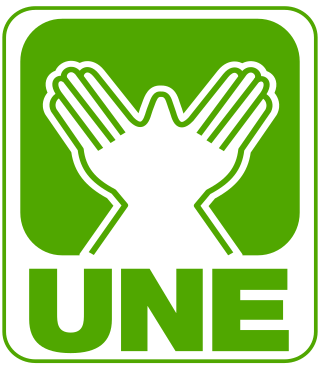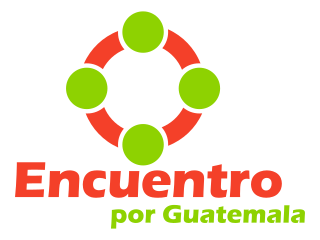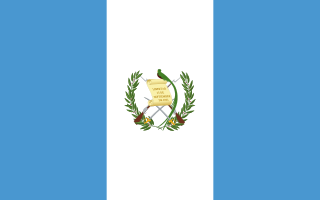Victory Victoria | |
|---|---|
 | |
| Leader | Amílcar Rivera |
| Founded | 2008 |
| Ideology | Christian politics [1] |
| Political position | Right-wing [2] |
| Colors | Red and blue |
| Congress | 3 / 160 |
| Website | |
| partidovictoria | |
Victory (Spanish : Victoria) is a political party in Guatemala.
Victory Victoria | |
|---|---|
 | |
| Leader | Amílcar Rivera |
| Founded | 2008 |
| Ideology | Christian politics [1] |
| Political position | Right-wing [2] |
| Colors | Red and blue |
| Congress | 3 / 160 |
| Website | |
| partidovictoria | |
Victory (Spanish : Victoria) is a political party in Guatemala.
The party was established in 2008. [3] It contested the 2011 general elections, although it did not nominate a presidential candidate. In the Congressional elections the party received 1.6% of the vote, winning one of the 158 seats. [4] Prior to the 2015 elections it joined an alliance with Todos and the Unionist Party. [3]
| Election | Candidates | First round | Second round | Status | |||
|---|---|---|---|---|---|---|---|
| President | Vice President | Votes | % | Votes | % | ||
| 2011 | Did not participate | ||||||
| 2015 | Did not participate | ||||||
| 2019 | Amílcar Rivera | Erico Can | 111,998 | 2.56 (#11) | — | — | Lost |
| 2023 | Amílcar Rivera | Fernando Mazariegos | 135,591 | 3.23 (#9) | — | — | Lost |
| Election | Votes | % | Seats | +/– | Status |
|---|---|---|---|---|---|
| 2011 | 71,588 | 1.63 (#11) | 1 / 158 | New | Opposition |
| 2015 | Did not participate; Victory candidates ran as part of LIDER | ||||
| 2019 | 101,418 | 2.52 (#18) | 3 / 160 | Opposition | |
| 2023 | 124,946 | 3.00 (#11) | 3 / 160 | External support | |

The Guatemalan National Revolutionary Unity is a Guatemalan political party that started as a guerrilla movement but laid down its arms in 1996 and became a legal political party in 1998 after the peace process which ended the Guatemalan Civil War.

Óscar José Rafael Berger Perdomo is a Guatemalan businessman and politician who served as the President of Guatemala from 2004 to 2008.

The National Advancement Party was a conservative political party in Guatemala. It was founded in 1989.

The National Unity of Hope is a populist political party in Guatemala. It was founded in 2002 and defined itself as a social-democratic and social-Christian party, but since transformed and is now described as a right-wing party. It is the largest political party in Guatemala by the number of members.

Álvaro Colom Caballeros was a Guatemalan engineer, businessman, and politician who served as the President of Guatemala from 2008 to 2012, as well as the General-Secretary of the political party, National Unity of Hope (UNE).
The Unionist Party is a conservative political party in Guatemala, who advocates the re-creation of a Central American union.

Otto Fernando Pérez Molina is a Guatemalan politician and retired general who served as the President of Guatemala from 2012 to 2015. Standing as the Patriotic Party candidate, he lost the 2007 presidential election but prevailed in the 2011 presidential election. During the 1990s, before entering politics, he served as Director of Military Intelligence, Presidential Chief of Staff under President Ramiro de León Carpio, and as the chief representative of the military for the Guatemalan Peace Accords. On being elected President, he called for the legalization of drugs.

Encuentro por Guatemala ("EG")– a Spanish name variously translated as "Encounter for Guatemala", or as "Together for Guatemala" (Reuters) – was a Guatemalan political party; encuentro may also translate as "gathering", "meeting", or "union".

The National Change Union, sometimes translated as the Union of National Change, was a national liberal political party in Guatemala.

Guatemala, officially the Republic of Guatemala, is a country in Central America. It is bordered to the north and west by Mexico, to the northeast by Belize, to the east by Honduras, and to the southeast by El Salvador. It is touched to the south by the Pacific Ocean and to the northeast by the Gulf of Honduras. With an estimated population of around 17.6 million, Guatemala is the most populous country in Central America, the 4th most populous country in North America and the 11th most populous country in the Americas. It's capital and largest city being Nueva Guatemala de la Asunción, also known as Guatemala City, is the most populous city in Central America. It is a representative democracy, although with significant levels of corruption.

Winaq is a left-wing political party in Guatemala whose most notable member is Rigoberta Menchú, who is ethnically Kʼicheʼ. Its name comes from the Kʼicheʼean word for "people" or "humanity", "winaq". It is a party whose roots are in the indigenous communities of Guatemala.

Sandra Julieta Torres Casanova is a Guatemalan politician who served as the first lady of Guatemala from 2008 to 2011, as the wife of president Álvaro Colom. As the candidate of the National Unity of Hope party, Torres ran for president in 2015, 2019 and 2023, coming in second place in each election.

Renewed Democratic Liberty was a centre-right political party in Guatemala.

Commitment, Renewal and Order is a political party in Guatemala.

Vision with Values is a political party in Guatemala.

James Ernesto Morales Cabrera is a Guatemalan politician, actor, and comedian who served as the 50th president of Guatemala from 2016 to 2020.

The National Convergence Front was a right-wing political party in Guatemala.

Movimiento Semilla is a centre-left, progressivist, social-democratic political party in Guatemala. As of January 14, 2024, it became Guatemala's current government party.

Alejandro Eduardo Giammattei Falla is a Guatemalan politician who served as the 51st president of Guatemala from 2020 to 2024.

General elections were held in Guatemala on 25 June 2023 to elect the president and vice president, all 160 seats in Congress, all 20 members of the Central American Parliament, and mayors and councils for all the country's 340 municipalities. Incumbent president Alejandro Giammattei was constitutionally prohibited from running for a second four-year term. However, as no presidential candidate obtained over 50 percent of the vote in the first round on 25 June 2023, a second round was held between the top two finishers on 20 August 2023: Congressman Bernardo Arévalo of the Movimiento Semilla and Sandra Torres, a former first lady representing the National Unity of Hope (UNE) party. Arévalo defeated Torres in the second round with nearly 61 percent of the vote in what was seen as a landslide. The ruling Vamos party won the largest number of seats in Congress.